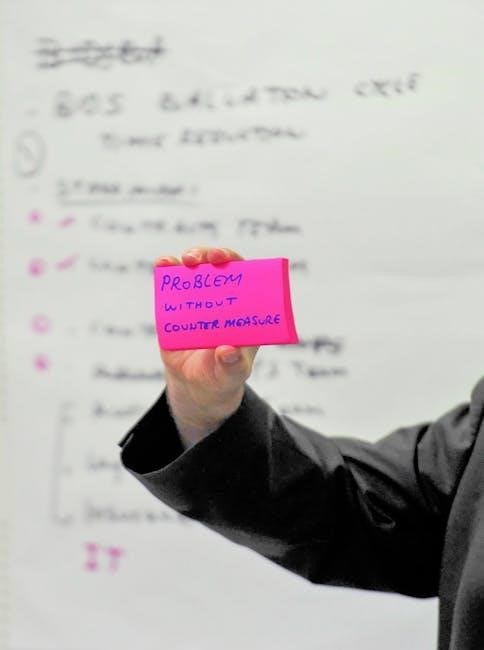Solution-Focused Therapy (SFT) emphasizes empowerment through future-oriented questions, helping clients identify strengths and solutions rather than dwelling on problems․ It’s widely used in therapy, coaching, and counseling, with resources like the 101 Solution-Focused Questions PDF guiding practitioners․
Understanding the Power of Solution-Focused Questions

Solution-focused questions are a cornerstone of Solution-Focused Therapy, guiding clients from problem analysis to solution-building․ These questions are designed to empower individuals by highlighting their strengths, resources, and past successes․ By focusing on the future and desired outcomes, they help clients envision achievable goals and pathways to success․ For example, questions like “What would your ideal future look like?” or “What steps have you already taken toward your goal?” foster hope and motivation․ This approach is nonlinear, emphasizing collaboration and resilience․ The effectiveness of these questions lies in their ability to redirect conversations toward solutions, making them invaluable in therapy, coaching, and counseling․ The 101 Solution-Focused Questions PDF offers a comprehensive toolkit for practitioners․

The Philosophy Behind Solution-Focused Brief Therapy (SFBT)
Solution-Focused Brief Therapy (SFBT) is rooted in the belief that clients possess the internal resources to solve their problems․ It emphasizes a forward-focused, goal-oriented approach, shifting attention from deficits to strengths․ SFBT assumes that solutions are often implicit in clients’ experiences and that small changes can lead to significant improvements․ The therapy is client-centered, respecting individuals’ unique perspectives and fostering collaboration․ By focusing on exceptions to problems and imagining a preferred future, SFBT empowers clients to construct meaningful solutions․ This approach is concise and efficient, aiming for measurable progress rather than prolonged exploration of issues․ The philosophy underscores the importance of language as a tool for change, making it a powerful framework for therapy and coaching․ Resources like the 101 Solution-Focused Questions PDF further enhance its practical application․

Categories of Solution-Focused Questions
Solution-focused questions are categorized into assessment, goal-setting, progress-measuring, and coping questions․ These categories help therapists and coaches guide clients toward identifying strengths, setting goals, tracking progress, and building resilience․ The 101 Solution-Focused Questions PDF provides a structured framework for organizing and applying these questions effectively in therapy sessions․
Assessment Questions for Identifying Resources and Strengths
Assessment questions in Solution-Focused Therapy are designed to uncover clients’ strengths and resources․ These questions help identify what works well in their lives and what they can build upon․ For example, asking, “What skills have you used to manage challenges before?” or “What strengths do you bring to this situation?” guides clients to reflect on their capabilities․ The 101 Solution-Focused Questions PDF offers a variety of such inquiries, enabling practitioners to explore clients’ resilience and past successes․ By focusing on positive attributes, these questions empower individuals to recognize their potential and leverage it for future progress․
Goal-Setting Questions for Defining Desired Outcomes
Goal-setting questions in Solution-Focused Therapy help clients clarify their desired outcomes, creating a clear vision for the future․ These questions encourage clients to imagine and articulate what they want to achieve․ For instance, “What would your ideal day look like?” or “How will you know when things are better?” guides them to define specific, measurable goals․ The 101 Solution-Focused Questions PDF provides numerous examples of such inquiries, assisting practitioners in helping clients establish clear objectives․ By focusing on what clients want rather than what they want to avoid, these questions foster a sense of direction and purpose, making the therapeutic process more effective and client-centered․
Progress-Measuring Questions for Tracking Growth
Progress-measuring questions in Solution-Focused Therapy help clients track their growth and celebrate small successes․ These questions, such as “On a scale of 1 to 10, how close are you to your goal today?” or “What would it take to move one step higher?” empower clients to reflect on their progress․ The 101 Solution-Focused Questions PDF offers a variety of tools to assess advancements, fostering motivation and resilience․ By focusing on incremental changes, these inquiries highlight clients’ strengths and resources, reinforcing their ability to achieve their goals․ Regular use of such questions ensures a clear, objective way to monitor development and maintain a positive, forward-oriented perspective throughout the therapeutic process․
Coping and Resilience Questions for Managing Challenges
Coping and resilience questions in Solution-Focused Therapy empower clients to manage challenges effectively by identifying their strengths and strategies․ These inquiries, such as “What have you done in the past to overcome similar difficulties?” or “How have you managed to cope so far?” help clients recognize their resilience․ The 101 Solution-Focused Questions PDF includes tools to explore coping mechanisms, fostering a sense of control and confidence․ By focusing on what works, these questions guide clients to build on their existing resources and develop practical solutions․ This approach not only addresses current challenges but also equips clients with skills to handle future obstacles, promoting long-term resilience and well-being․

Practical Applications of Solution-Focused Questions
Solution-focused questions are practically applied in therapy and coaching sessions to empower clients, identify strengths, and track progress, guided by resources like the 101 Solution-Focused Questions PDF․
Using Solution-Focused Questions in Therapy Sessions

Therapists utilize solution-focused questions to guide clients toward identifying strengths and solutions․ These questions, such as those in the 101 Solution-Focused Questions PDF, encourage clients to envision their desired future and outline actionable steps․ By focusing on progress and resilience, therapists help clients move beyond problems․ The structured approach ensures sessions remain constructive, fostering hope and empowerment․ This method is particularly effective in brief therapy, where time is limited, and results are prioritized․ The PDF serves as a valuable resource, offering diverse questions tailored for various client needs and scenarios, enhancing the therapeutic process․
Integrating Questions into Coaching and Counseling Practices
Coaches and counselors seamlessly integrate solution-focused questions into their practices to foster client empowerment․ The 101 Solution-Focused Questions PDF provides a structured framework for identifying strengths, setting goals, and measuring progress․ These questions, categorized into assessment, goal-setting, and progress-measuring, enable professionals to tailor sessions to individual needs․ By focusing on resilience and future outcomes, practitioners help clients overcome challenges and achieve desired results․ The PDF’s examples, such as scaling questions, offer practical tools for real-world application․ This approach enhances client engagement and accelerates progress, making it a valuable resource for both therapy and coaching settings․ Its versatility ensures effectiveness across diverse client scenarios and goals․

Resources and Tools
The 101 Solution-Focused Questions PDF offers a valuable resource for practitioners, providing categorized questions and practical tools to enhance therapy and coaching sessions effectively․
Downloadable PDF Guides and Worksheets
Downloadable PDF guides, such as the 101 Solution-Focused Questions workbook, provide therapists, coaches, and counselors with practical tools to enhance their practice․ These resources offer categorized questions tailored for specific scenarios, making it easier to apply solution-focused techniques in sessions․ The guides include examples and exercises to help practitioners master the art of asking empowering questions․ Worksheets enable clients to reflect on their goals, strengths, and progress, fostering a collaborative approach to therapy; By leveraging these resources, professionals can streamline their workflow and create meaningful outcomes for their clients․ The PDF format ensures accessibility, allowing users to print or digitally annotate the materials as needed․
Recommended Reading for Solution-Focused Practitioners

For practitioners seeking to deepen their understanding of Solution-Focused Therapy, several key resources are highly recommended․ Fredrike Bannink’s 1001 Solution-Focused Questions: Handbook for Solution-Focused Interviewing is a seminal work, offering a wealth of practical questions and techniques․ Additionally, her 101 Solution-Focused Questions for Help with Anxiety provides tailored strategies for addressing specific challenges․ These books, along with guides like 101 Solution-Focused Questions, offer comprehensive frameworks for applying SFBT principles in various settings․ They are invaluable for therapists, coaches, and counselors aiming to enhance their skills in fostering client empowerment and solution-oriented thinking․

Real-World Examples and Case Studies
Case studies highlight how solution-focused questions empower individuals to overcome challenges; For instance, in anxiety treatment, questions like “What would your ideal day look like?” guide clients toward envisioning and achieving positive outcomes, fostering resilience and hope․
Success Stories from Applying Solution-Focused Questions
Many practitioners report remarkable outcomes using solution-focused questions․ For example, a client struggling with depression was asked, “What would your life look like without depression?” This question shifted their focus to possibilities, helping them identify small, achievable steps․ Similarly, in a case of anxiety, a therapist used, “What would you do if you felt more confident tomorrow?” to guide the client toward actionable solutions․ These stories demonstrate how solution-focused questions empower individuals to envision and create positive change, fostering resilience and hope․ The 101 Solution-Focused Questions PDF offers similar tools, proving their effectiveness in real-world applications․
Overcoming Challenges with Effective Questioning Techniques
Solution-focused questions are particularly effective in helping clients navigate difficult situations․ For instance, scaling questions like, “On a scale of 1 to 10, how confident are you in handling this challenge?” encourage self-reflection and progress tracking․ Open-ended questions such as, “What would you do if this obstacle were no longer present?” guide clients toward envisioning solutions․ These techniques empower individuals to focus on their strengths and resources, fostering resilience․ The 101 Solution-Focused Questions PDF provides a comprehensive toolkit for practitioners, offering practical examples to address anxiety, trauma, and other challenges․ By shifting the focus from problems to possibilities, these questions inspire hope and actionable steps for positive change․
Solution-Focused Therapy empowers individuals by shifting focus to solutions and strengths․ The 101 Solution-Focused Questions guide provides practical tools for personal and professional growth, fostering resilience and clear action․
The Impact of Solution-Focused Questions on Personal and Professional Growth

Solution-focused questions have a transformative impact on both personal and professional growth by fostering resilience, clarity, and actionable steps․ They empower individuals to identify strengths, set clear goals, and measure progress, leading to increased confidence and problem-solving abilities․ In professional settings, these questions enhance collaboration, creativity, and client-centered outcomes, making them invaluable for therapists, coaches, and counselors․ The 101 Solution-Focused Questions guide provides a structured approach to applying these techniques, ensuring lasting positive change․ By shifting focus from problems to solutions, individuals and professionals alike can achieve meaningful growth and unlock their full potential․



